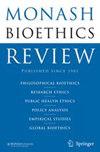“这并不比吃掉它们更糟糕”:生物伦理学类比的极限。
IF 1.6
Q2 ETHICS
引用次数: 3
摘要
生物伦理学家经常通过与我们已经熟悉和目前容忍的做法进行类比来为新的做法辩护。如果某种新颖的做法不如某些广为接受的做法糟糕,那么(有人认为)我们就不能正确地拒绝它。以关于异种移植和种间胚泡互补的生物伦理学文献为例,我展示了这种论证方式是如何出错的。关键问题是,我们对熟悉的行为的道德直觉可能会被它们看似正常的行为所扭曲。在考虑新兴技术和新实践的伦理问题时,我们应该对我们对熟悉的实践的道德观是错误的可能性保持开放的态度。本文章由计算机程序翻译,如有差异,请以英文原文为准。
'It's not worse than eating them': the limits of analogy in bioethics.
Bioethicists often defend novel practices by drawing analogies with practices that we are already familiar with and currently tolerate. If some novel practice is less bad than some widely-accepted practice, then (it is argued) we cannot rightly reject it. Using the bioethics literature on xenotransplantation and interspecies blastocyst complementation as a case study, I show how this style of argument can go awry. The key problem is that our moral intuitions about familiar practices can be distorted by their seeming normality. When considering the ethics of emerging technologies and novel practices, we should remain open to the possibility that our moral views about familiar practices are mistaken.
求助全文
通过发布文献求助,成功后即可免费获取论文全文。
去求助
来源期刊

Monash Bioethics Review
ETHICS-
CiteScore
2.70
自引率
6.20%
发文量
16
期刊介绍:
Monash Bioethics Review provides comprehensive coverage of traditional topics and emerging issues in bioethics. The Journal is especially concerned with empirically-informed philosophical bioethical analysis with policy relevance. Monash Bioethics Review also regularly publishes empirical studies providing explicit ethical analysis and/or with significant ethical or policy implications. Produced by the Monash University Centre for Human Bioethics since 1981 (originally as Bioethics News), Monash Bioethics Review is the oldest peer reviewed bioethics journal based in Australia–and one of the oldest bioethics journals in the world.
An international forum for empirically-informed philosophical bioethical analysis with policy relevance.
Includes empirical studies providing explicit ethical analysis and/or with significant ethical or policy implications.
One of the oldest bioethics journals, produced by a world-leading bioethics centre.
Publishes papers up to 13,000 words in length.
Unique New Feature: All Articles Open for Commentary
 求助内容:
求助内容: 应助结果提醒方式:
应助结果提醒方式:


